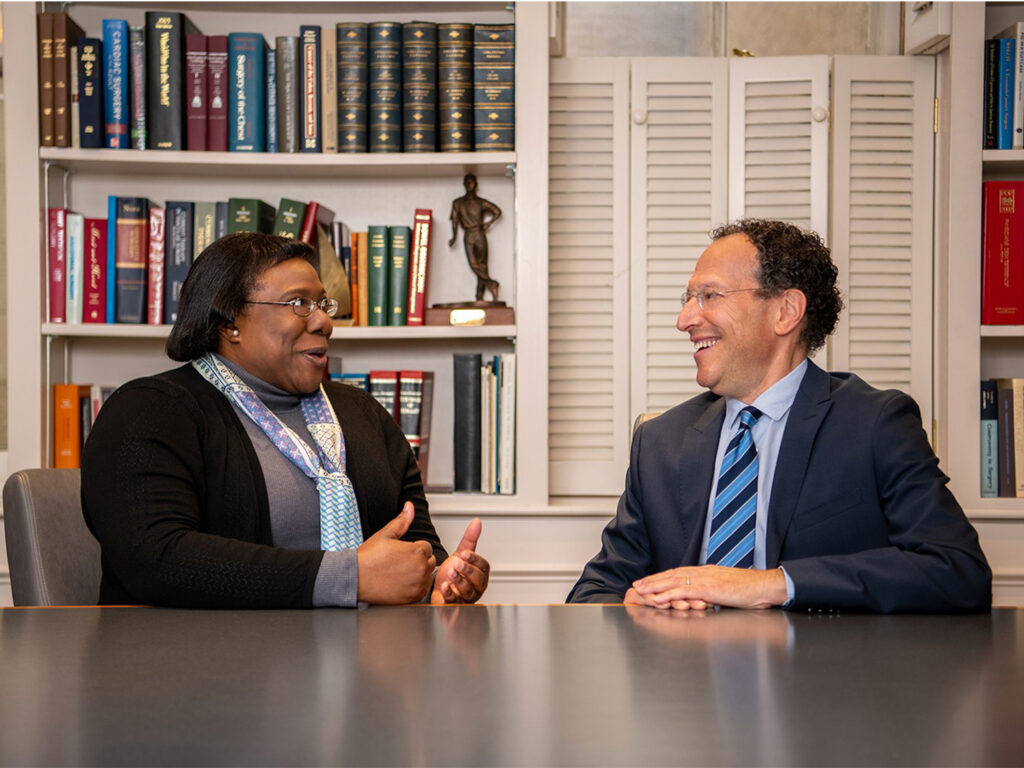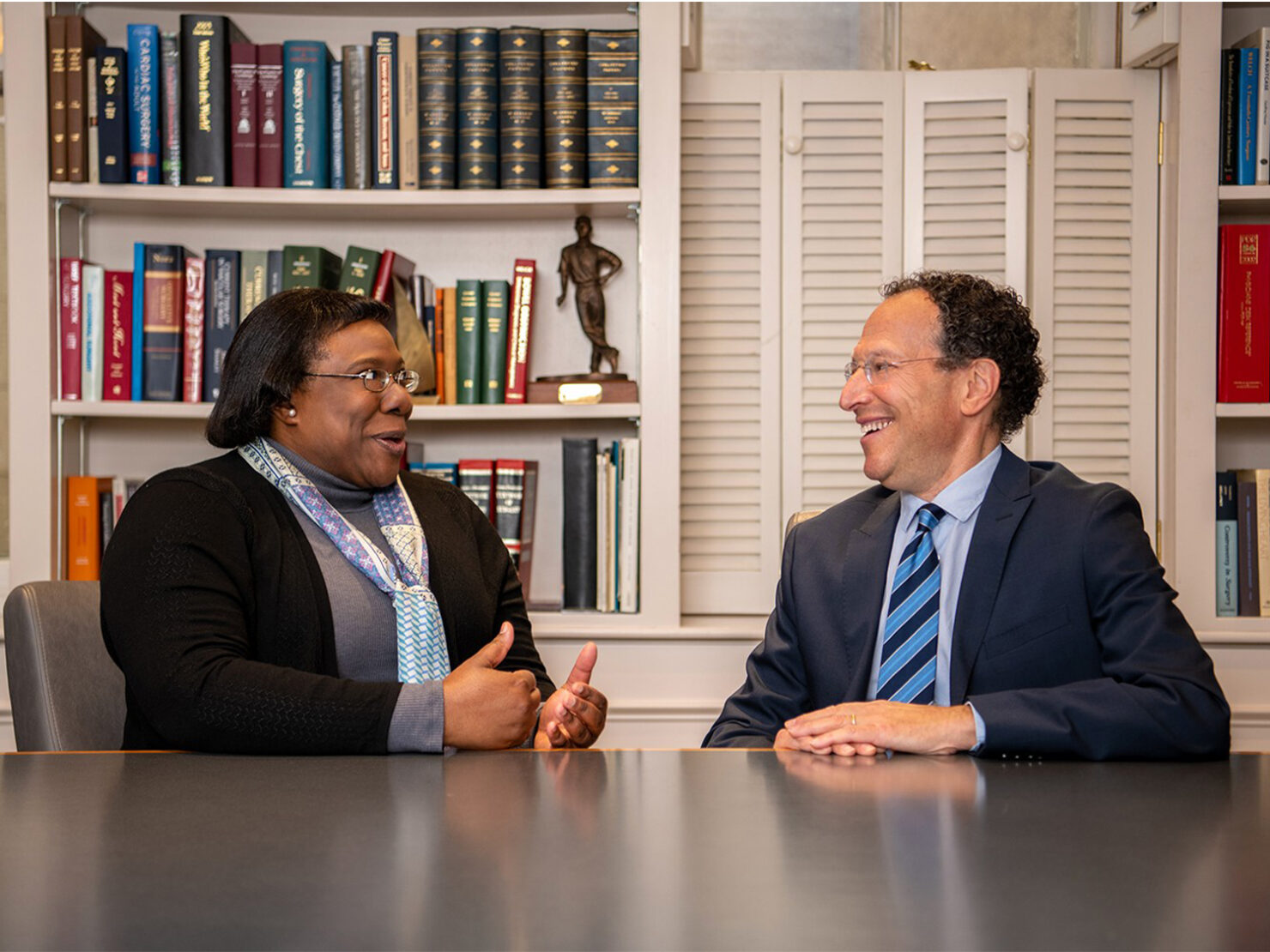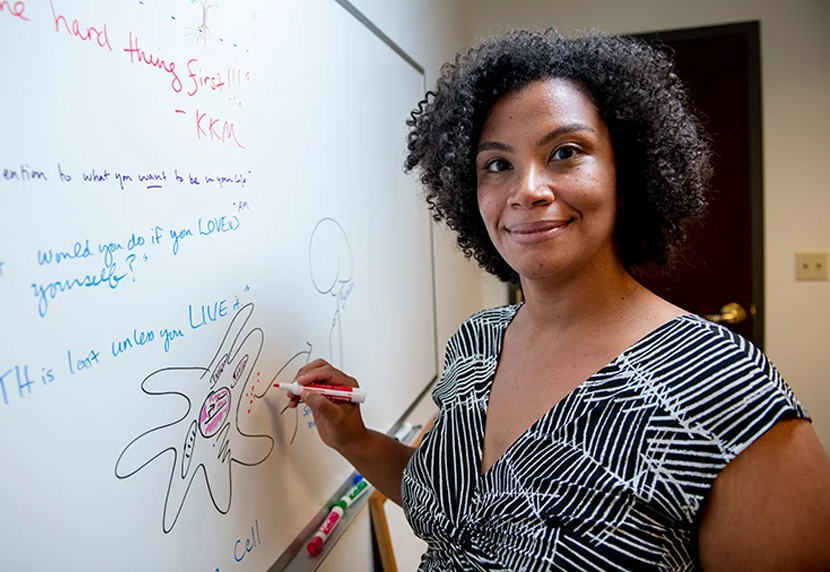Olivia I. Okereke, MD, MS, credits her decision to focus her career in geriatric psychiatry to the mentors and colleagues who inspired her, but most of all, to the patients and their loved ones she met during training. As a young research assistant in a cognitive neuroscience laboratory, Dr. Okereke administered patient assessments during home visits, where she would get to know her patients — mostly older adults and their families — and see firsthand how their illness was impacting the household. Later, she worked in a research lab studying the neuropsychiatric manifestations of Alzheimer’s disease (AD), which largely affects older adults, and it was here that Dr. Okereke realized she’d found her path.
“We come to this current integration with a rich sense of the strengths of both institutions in psychiatry, neurology and beyond. There is so much opportunity for inspiration and collaboration. Psychiatry is interdisciplinary work and we’re excited to continue to promote that now and in the future.”
“Throughout my training, I really enjoyed seeing how much my colleagues interfaced with patients and their families,” says Dr. Okereke. “It was clear this was a specialty where you engage with the whole picture of the patient, including their spouse, children and entire network of loved ones. That’s how you provide the best care and get the full story. It’s a discipline that really honors that and makes it routine.”
Now, as chief of the Division of Geriatric Psychiatry and Aging, Dr. Okereke is focused on leading Mass General Brigham’s (MGB) integrated efforts toward providing worldclass, comprehensive geriatric psychiatry care that enables adults to live longer and age in place, at home, for as long as possible.
“We come to this current integration with a rich sense of the strengths of both institutions in psychiatry, neurology and beyond,” says Dr. Okereke, who served as director of Geriatric Psychiatry. “There is so much opportunity for inspiration and collaboration. Psychiatry is interdisciplinary work, and we’re excited to continue to promote that now and, in the future.”
Pursuing Universal and Personalized Approaches to Brain Health
Maintaining brain health, which includes the full span of cognitive, emotional, sensory and motor abilities, is an urgent priority for older adults. According to the Centers for Disease Control and Prevention, cognitive impairment — which is a risk factor for developing AD and other dementias — affects at least one-third of older adults. And depression affects more than 300 million people globally, including adults. Furthermore, sensorimotor impairments, such as hearing, vision and mobility problems, are very common for older people and impede their daily lives. Given the prevalence of these conditions, a comprehensive strategy is needed — one with scalability and universal reach that is also responsive to individual needs and characteristics.

One of the efforts underway to develop this comprehensive strategy is the Care for America’s Aging project. This philanthropy-funded initiative, led by Dr. Okereke and Anthony P. Weiner, MD, the Millicent and Eugene Bell Director in Older Adult Outpatient Psychiatry, is exploring new ways to provide older Americans with high-quality, preventive care in their homes, while reducing costs, improving patient outcomes and offering career advancement opportunities and support to home health professionals.
“I have spent a lot of my research career looking at risk factors and seeing how they translate to strategies of prevention for older adults at risk for depression, dementia or cognitive decline,” says Dr. Okereke. “This multi-year project reflects the tremendous progress we have made in this space so far and recognizes the crucial role home health care professionals have in this work.”
Shaping Preventive Precision Psychiatry Care
Dr. Okereke and her team are also focused on improving brain disease prevention efforts through innovation in three key areas: cutting-edge research, advanced training programs, and a “living laboratory” that ensures this research is translated from bench to bedside as quickly as possible.
By identifying patients’ individual risk factors, which can include genetic and lifestyle-related elements such as diet, Dr. Okereke and her team believe it’s possible to create tailored prevention strategies to help people reduce their risk or avoid entirely developing brain health disorders.
“Each patient’s prevention strategy will be a little different,” says Dr. Okereke. “For some, it could be a drug, a supplement or a lifestyle change — or a menu of behavior changes and no medication or pills. It’s exciting to look at what this menu of preventive interventions could be and how it can be customized to deliver the best outcomes possible for everyone.”
Dr. Okereke says that philanthropy will be key to sustaining this important momentum toward creating a precision prevention approach for brain health. An increased investment in this important work would allow Dr. Okereke to support the specialists and other personnel needed to expand this work, which will, ultimately, inform practice across the entire MGB healthcare system and beyond.
“Together with our community of supporters, we will continue to expand and enhance this important prevention work so that, one day soon, brain healthcare becomes routine for everyone, no matter who they are or where they live,” says Dr. Okereke. “Everyone deserves to age peacefully and healthfully in the comfort of their own homes and in the company of loved ones, for as long as they can. I’m honored to work toward this meaningful goal every day.”
Care for America’s Aging is a four-year project that explores solutions to provide older Americans with high-quality, preventive care in their homes, while reducing costs, improving patient outcomes and offering career advancement opportunities to home health professionals.
To learn more about Dr. Okereke’s work and this burgeoning field of psychiatry, contact us.




